Posts Tagged afterlife
BEST BOOKS OF 2020
Posted by Amy Steele in Books on January 4, 2021
I read 87 books this year– 84 by women; three by men; 32 by BIPOC authors. The shortest book I read was Intimations by Zadie Smith. The longest book I read was Goldfinch by Donna Tartt. Here are the best books (5/5*) that were published in 2020 that I read.
Intimations by Zadie Smith
Penguin Books, July 2020. 97 pg.
A slim collection of essays–about aging, community, race, COVID 19, writing– that Zadie Smith wrote during the pandemic. There’s much to consider within these pages of thoughtful, personal and universal essays. She explains: “Talking to yourself can be useful. And writing means being overheard.”
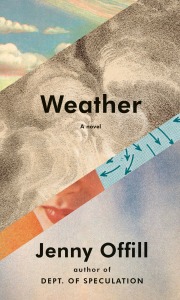 Weather by Jenny Offill
Weather by Jenny Offill
Knopf, February 2020. 207 pg.
fantastic, creative and timely novel addressing the current climate crisis and the impending apocalypse. it’s from the point-of-view of a middle-aged woman –so definitely relatable to me (I want to read more novels about older women). She’s married and has a son. Her brother is a recovering drug addict and she’s had to care for him throughout the years. Jenny Offill excels at this observational narrative. It’s short, riveting, potent. It’s really the perfect thing to read during this COVID-19 pandemic and quarantine we’re all experiencing. Plus it’s quite relatable to middle-aged spinster GenX me: “The woman has just turned fifty. She tells me about her blurriness, the way she is hardly seen. She supposes she is not so pretty anymore–fattish, hair a bit gray. What she has noticed, what gives her a little chill, she tells me, is how if she meets a man out of the context of work, he finds her to not be worth much. He looks over her shoulder as he talks or pawns her off on a woman her own age.”
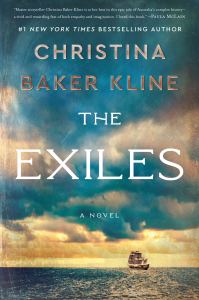 The Exiles by Christina Baker Kline
The Exiles by Christina Baker Kline
Custom House, August 2020. 370 pg.
I loved this amazing work of historical fiction so much and don’t know why I waited so long to write about it! It covers an intriguing aspect of history that I’ve not read much about. Based on actual events, the novel focuses on a ship of female convicts traveling from England to Van Diemen’s Land (Tasmania) in the 1850s. Although Aboriginal people have occupied Australia for thousands of years, the British government views the native people as nuisances and the land to be uninhabited and available for their use. It’s amazing to think about some of the low level crimes for which many were sentenced as well as the harrowing passage. “Evangeline recalled seeing small items in the newspaper over the years about the incorrigibles– men, she thought– transported on convict ships to Australia. Murderers and other deviants exiled to the far side of the earth, ridding the British Isles of the worst of its criminals.” Evangeline is a governess accused of stealing a ring which had been given to her by the family’s older son with whom she’d become romantically involved. She’s well-educated and her late father was a minister. The other staff members didn’t like her. “She was, by temperament, much like her father: diffident, with a shyness often mistaken for aloofness, a bookishness perceived as snobbery.” She’s sentenced to 14 years in prison. She’s pregnant and gives birth to a daughter onboard. Sadly she’s thrown overboard by a crew member who she’d stabbed to protect Hazel, who he’d been sexually assaulting. Hazel is a scrappy convict whose midwife mother taught her many potions and remedies. Mathinna is a native woman who knows how to read and learns to speak French. She’s taken from her tribe by Van Diemen’s governor’s wife on a whim. She considers her a project. It doesn’t work out well. The novel’s a complete page turner and I became so invested in these women I didn’t want it to end.
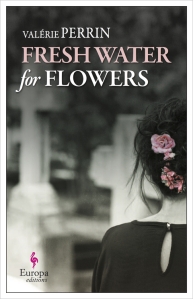 Fresh Water for Flowers by Valerie Perrin
Fresh Water for Flowers by Valerie Perrin
Europa, June 2020. 476 pg.
“My closest neighbors don’t quake in their boots. They have no worries, don’t fall in love, don’t bite their nails, don’t believe in chance, make no promises, or noise, don’t have social security, don’t cry, don’t search for their keys, their glasses, the remote control, their children, happiness.”
I walk in cemeteries fairly often. There’s one in my neighborhood. When I was in grad school, I would drive to the Arlington National Cemetery to take walks through it. I liked the quiet and solitude. I sometimes wonder about the people whose names I see on gravestones. Violette Toussaint is a cemetery caretaker in the small French town Bourgogne. She lives on site. She takes notes on everyone who’s buried there. She’s close friends with three gravediggers, three groundskeepers and a priest. She feeds the stray cats that roam the cemetery. She reads. She bakes. It sounded fairly idyllic to me. I love the writing and this character. Violette is different, interesting, smart, thoughtful. I found myself deeply connected to her– “I don’t fit into boxes. I’ve never fit into boxes. When I do a test in a women’s magazine– “Get to know yourself,” or “Know yourself better”–there’s no clear result for me. I’m always a bit of everything.” I don’t fit in boxes either.
“I’m not after a love story. I’m too old for that. I’ve missed the boat. My meager love life is an old pair of socks shoved to the back of the closet.”
Julian Sole, a police detective, arrives one day and tells Violette that his mother wanted her ashes spread on someone’s grave who wasn’t her husband. He wants to know why. Violette reflects on her own husband who had numerous affairs and left her. She recalls: “He turned our bed into a paradise, was considerate and sensual when making love, but as soon as he got up, was vertical, left our horizontal love behind, he lost a good deal of color. He had nothing to say, and was interested only in his motorbike and video games.” Violette’s mother abandoned her and she was pregnant at 18. Drawn to each other, Violette and Julian spend more time together as they help reconcile the past. There are more secrets of the dead and the past revealed but I can’t give too much away or I’d ruin it. The novel unwinds with several twists. It’s smart, funny and dark. Just what I like. It’s a full reflection on life and death and everything involved.
Julian Sole, a police detective, arrives one day and tells Violette that his mother wanted her ashes spread on someone’s grave who wasn’t her husband. He wants to know why. Violette reflects on her own husband who had numerous affairs and left her. She recalls: “He turned our bed into a paradise, was considerate and sensual when making love, but as soon as he got up, was vertical, left our horizontal love behind, he lost a good deal of color. He had nothing to say, and was interested only in his motorbike and video games.” Violette’s mother abandoned her and she was pregnant at 18. There are more secrets of the dead and the past revealed but I can’t give too much away or I’d ruin it. The novel unwinds with several twists. It’s smart, funny and dark. Just what I like. It’s a full reflection on life and death and everything involved.
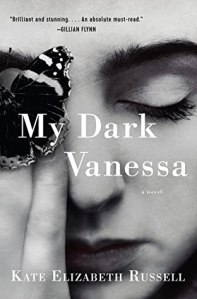 My Dark Vanessa by Kate Elizabeth Russell
My Dark Vanessa by Kate Elizabeth Russell
William Morrow, March 2020. 373 pg.
A 42-year-old English teacher at a prep school in Maine grooms then rapes his 15-year-old student. Although it’s a story that ‘s been told numerous times, it’s a remarkably strong perspective that’s completely engrossing. The story alternates between 2000 and 2017 where adult Vanessa finds herself finally recognizing the level of abuse and how it’s affected her. I have a memory from high school of being in gym class and one of my classmates going up to a (very attractive) teacher and unbuttoning a button on his shirt and commenting something about the full buttoned up style. It was so bold. That was how this popular student commanded attention. I didn’t even kiss a boy until college. Vanessa is incredibly naïve as a student: “It wasn’t about how young I was, not for him. Above everything else, he loved my mind. He said I had genius-level emotional intelligence and that I wrote like a prodigy, that he could talk to me, confide in me. Lurking deep within me, he said, was a dark romanticism, the same kind he saw within himself. No one had ever understood that dark part of him until I came along.” Vanessa writes poetry. Mr.. Strane gives her Sylvia Plath, Emily Dickinson, Edna St. Vincent Millay to read and then he gives her Lolita. As an adult, Vanessa recognizes: “I still feel different from others, dark and deeply bad, same as I did at fifteen, but I’ve tried to gain a better understanding of the reasons. I”ve become an expert on the age-gap trope, consuming books, films, anything featuring a romance between an adult and legal child. I search endlessly for myself but never find anything truly accurate.” She’s also finding it difficult to have relationships with me. She notes: “There are men who never turn into boyfriends, who peer behind the curtain and see the mess of me–literal and figurative: the apartment with a narrow path through the clothes and trash leading from bed to bathroom; the drinking, endless drinking; the blackout sex and nightmares.”
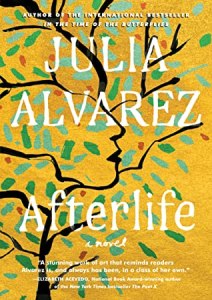 Afterlife by Julia Alvarez
Afterlife by Julia Alvarez
Algonquin, April 2020. 256 pg.
Antonia is a recently widowed, retired English teacher who lives in Vermont. One night she arrives home to find an undocumented pregnant teenager on her doorstep. Then, her sister, who suffers with Bipolar disorder, goes missing. “You’re the most American of us, her sisters have commented to Antonia in an accusatory tone. Just saying, they said smugly when she asked what was wrong with being whoever she was. Admittedly, she was the worrier, the insomniac, the most anxious and disciplined of the sisters.” Through gorgeous prose and astute observations, Julia Avarez examines a woman’s struggles to maintain her individual identity as well as to navigate relationships with her three sisters and her immigrant community.
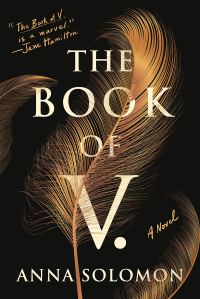 The Book of V by Anna Solomon
The Book of V by Anna Solomon
Henry Holt & Company, May 2020, 320 pg.
I gasped excitedly when I walked into the break room at my bookstore job and saw the ARC of this novel. I tore through this book in two days. Leaving Lucy Pear is one of my favorite novels and now after reading this I’ll count Anna Solomon as a favorite author. This novel focuses on three Jewish women– Lily is a mother, second wife and writer in 2016. Vivian is a political wife during the Watergate-era. Esther is an independent woman in ancient Persia. They’re all strong, independent-minded women. and Solomon fully explores each character’s motivations, desires, needs, struggles, commonalities and connections across the centuries.
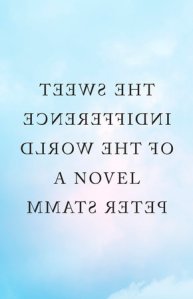 The Sweet Indifference of the World by Peter Stamm
The Sweet Indifference of the World by Peter Stamm
Other Press, January 2020. 160 pg.
I only read one book by a white male author and this is it. I have a handful of favorite cis white male authors and Peter Stamm counts as one of them. I read them immediately. I appreciate his gorgeous, melancholy writing. This one is short and interesting– a writer, Christoph, meets a woman, Lena, who is the doppelganger of his former lover, Magdalena, who inspired his first novel post breakup. Lena recognizes her own relationship with a writer named Chris in the story she’s told. This one blurs past and present, fiction and reality. How much does reality influence fiction and fiction influence reality? He comments: “With youthful pathos, I had believed I had to decide between her and my writing, between freedom and love. Only now did I understand that love and freedom were not mutually exclusive, but mutually entailed: the one wasn’t possible without the other.”







You must be logged in to post a comment.